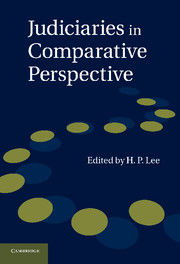Book contents
- Frontmatter
- Contents
- Contributors
- Foreword
- Preface
- Table of cases
- Table of statutes
- Part I
- Part II
- Part III
- Part IV
- Part V
- 20 Judges and non-judicial functions in Australia
- 21 The impact of extra-judicial service on the Canadian judiciary
- 22 Judges and the non-judicial function in New Zealand
- 23 Judges and non-judicial functions in South Africa
- 24 Judges and non-judicial functions in the United Kingdom
- 25 Judges and non-judicial functions in the United States
- Part VI
- Index
- References
21 - The impact of extra-judicial service on the Canadian judiciary
the need for reform
from Part V
Published online by Cambridge University Press: 07 September 2011
- Frontmatter
- Contents
- Contributors
- Foreword
- Preface
- Table of cases
- Table of statutes
- Part I
- Part II
- Part III
- Part IV
- Part V
- 20 Judges and non-judicial functions in Australia
- 21 The impact of extra-judicial service on the Canadian judiciary
- 22 Judges and the non-judicial function in New Zealand
- 23 Judges and non-judicial functions in South Africa
- 24 Judges and non-judicial functions in the United Kingdom
- 25 Judges and non-judicial functions in the United States
- Part VI
- Index
- References
Summary
In a 1985 speech to the Canadian Bar Association, Chief Justice Dickson emphasised the importance of an independent and impartial judiciary in maintaining and protecting the rule of law. For Dickson, the rule of law required not only that the judiciary should be the exclusive arbiter of disputes, but that the judges should ‘not depart from their proper function of law interpretation and application’ and their ‘primary task of deciding cases and dispensing justice’. Dickson stressed his increasing concern ‘about certain extra-judicial activities which could tend to politicise the role of judges and detract from their impartial and independent status’. He specifically cautioned judges against accepting requests to serve on public inquiries and royal commissions.
Recent experience has demonstrated that Dickson’s advice has not always been followed. Canadian governments at both the federal and provincial levels have increasingly looked to sitting judges to occupy non-judicial roles. Sitting judges have not been shy to accept these appointments, particularly to public inquiries. In recent years, inquiries such as Walkerton, Somalia, Gomery, Arar, Cornwall, Goudge, the Computer Leasing Scandal and the Oliphant Inquiry have occupied not only the headlines, but also considerable time and energy of sitting Canadian judges.
- Type
- Chapter
- Information
- Judiciaries in Comparative Perspective , pp. 428 - 451Publisher: Cambridge University PressPrint publication year: 2011



